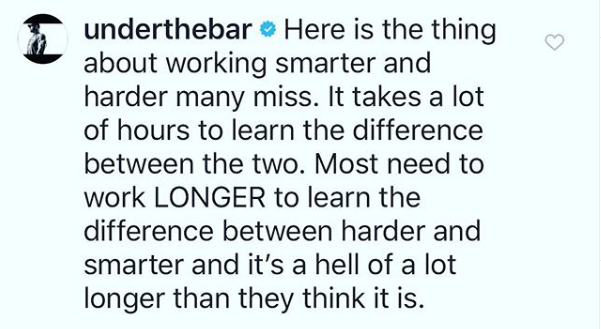
I forget what the post that @joesullivanpowerlifter made was about, but I posted this as a comment.
I get the working “smarter than working harder” statement, but I think that what gets left out is the part about working long enough to know what “smart” actually is.
If “mastery” is gained with 10,000 hours of progressing knowledge and experience, this means you learn more and/or get better by the hour, so that’s a pretty good way to define if we know what smarter vs harder work is.
A few things I’ve learned from those whom I feel excel at their craft is that they are decisive, they know that they don’t know more than they do. But what they do know, they can explain to a 4th grader, and they are always learning - they just become very selective and focused on learning things they need to learn at that given time or that will be useful in the near future. Those who excel at their craft also learn about topics outside that specialty of theirs, and they are always teaching what they know. Teaching is the highest form of learning.
You can work in a very smart way for a quarter of the time it takes others and yield a good or poor return (mostly poor), or you can work for a longer period of time but yield 3 or 4 poor returns and a great one - not to mention you still learned from those 3-4 poor returns.
This is only true if we assume that the work is actually being done.
Show me someone who works hard for long hours and many years and I’ll show you a very valuable asset - someone who’s leading their trade.
Show me someone who works smart but in the shortest time possible and I’ll show you someone who will be a liability within 3-5 years.
Don’t be fooled: it takes hard, smart work over long hours and time to learn, master and excel at something. Look at the commonality of all those who - really - lead any field and you will find this to be true.










